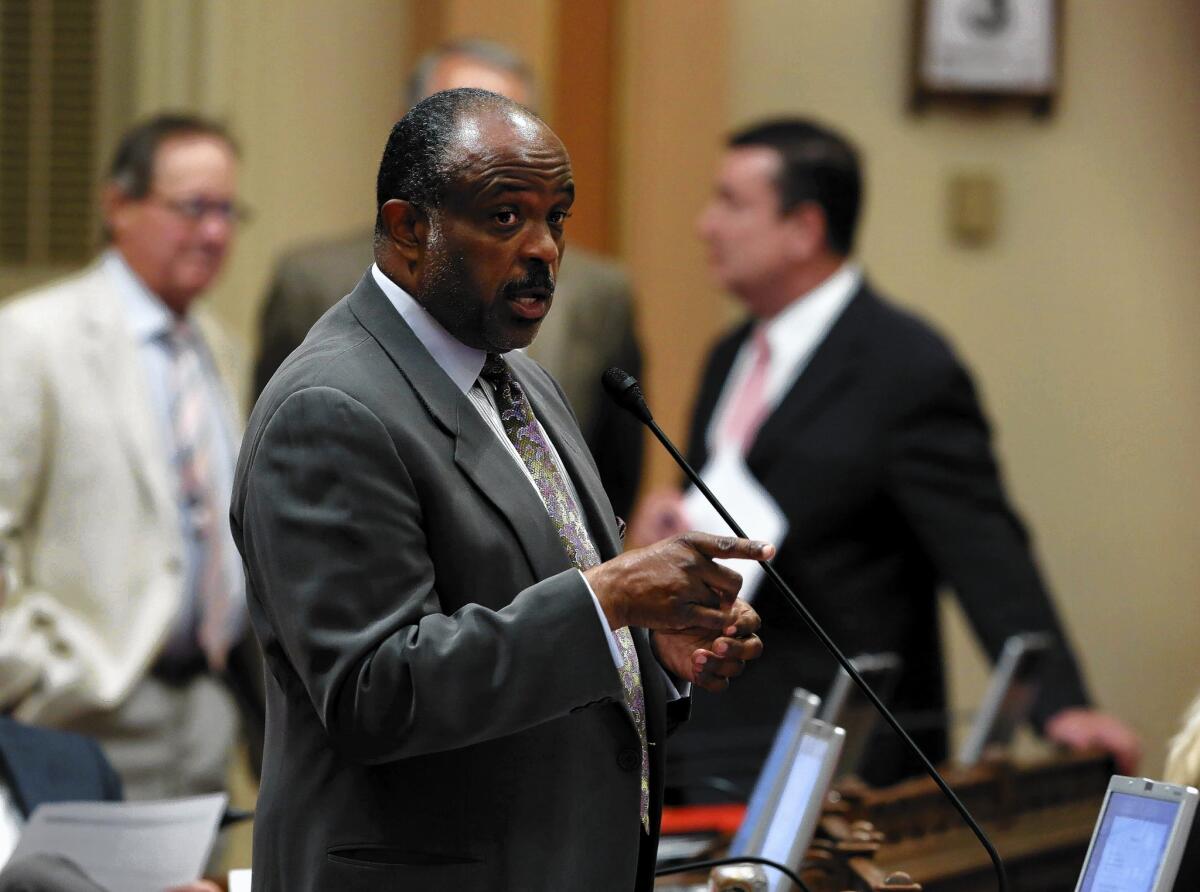Senator misled voters during run for district seat, prosecutors say

- Share via
State Sen. Roderick D. Wright deliberately misled voters and broke the law when he took steps to run for an Inglewood-area seat several years ago, a Los Angeles County prosecutor said Thursday. He spoke during opening statements in Wright’s trial on perjury and voter fraud charges.
Wright’s lead defense attorney countered that the veteran Democratic lawmaker acted properly and was the victim of a “murky” law governing residency rules for candidates and officeholders. Wright has pleaded not guilty.
More than three years after his September 2010 indictment on eight felony counts, Wright faced a nine-woman, three-man jury in a downtown Los Angeles courtroom.
Before the proceedings began, Wright’s attorney, Winston Kevin McKesson, said his client would testify in the case, which is expected to take two to three weeks. Prosecutors, McKesson said, were “trying to make somebody a convicted felon for the most minor” of matters.
Wright, 61, voiced a similar sentiment while waiting for the judge to start the session. With all the serious crimes occurring, Wright said, it was “hard for me to believe” that he was in court on these matters.
Deputy Dist. Atty. Bjorn Dodd told the jury he would show that Wright committed perjury and later voted illegally by making it appear that he lived in one place — and was therefore eligible to run for office and vote in what was then the 25th state Senate District — when he really lived in a neighboring district.
State law requires that candidates live in the districts they seek to represent, and that voters register and cast ballots only in the districts where they live.
The prosecution’s case sprang from a tip to its public integrity division around the time Wright won the seat in 2008, according to the district attorney’s office. It focuses on two properties owned by Wright.
One is a modest five-unit Inglewood rental complex that Wright has owned since 1977. He gave it as his address on his candidacy forms, starting in 2007, and on his voter registration form. He voted in the district assigned to that address, according to prosecutors.
The other property is a single-family home in upscale Baldwin Hills. He bought it in 2000, and the prosecution alleges it was his true home.
Dodd showed the jury photos of the two sites, taken on the day in 2009 when investigators searched both premises. They showed exterior and interior shots of the homes and their contents, which included few of the senator’s personal effects in Inglewood and three luxury cars, full closets and memorabilia in Baldwin Hills.
Witnesses in both neighborhoods will testify that they saw Wright frequently at the Baldwin Hills house but not much at the Inglewood home, according to Dodd.
“It didn’t appear [to Inglewood tenants] that he really lived there ... or spent any real time there,” Dodd said.
A key witness in the case is expected to be a woman who lived in a dwelling at the back of the Inglewood property for many years with Wright’s father and who continued to rent it from Wright after his father’s death in 1991. In 2007, Wright made an agreement with her allowing him to occupy part of that house in exchange for a break on her rent, the prosecution said.
McKesson said Wright bought the Baldwin Hills house as an investment and never intended to use it as his legal residence. Wright did not claim a property tax exemption available for owner-occupied homes, McKesson said, and he dedicated the top floor as an office for his real estate investment business so he wouldn’t be using state-provided facilities for it.
The residency issues first surfaced in a May 2008 Los Angeles Times article about Wright’s primary-election contest with former U.S. Rep. Mervyn Dymally, who also was alleged by some to live outside the district.
“Sometimes the law gets murky,” McKesson said, adding that Wright had taken every step he thought was required to run.
Much of the case is expected to hinge on the distinction between a “domicile” and a “residence,” both sides indicated.
After besting Dymally in a close-fought race, Wright went on to win the 2008 general election by a large margin in the strongly Democratic district.
In 2012, he won a second four-year term, pulling in nearly 77% of the vote against a little-known, poorly financed Republican candidate. Before his election to the state Senate, Wright served three terms in the Assembly.
More to Read
Sign up for Essential California
The most important California stories and recommendations in your inbox every morning.
You may occasionally receive promotional content from the Los Angeles Times.











